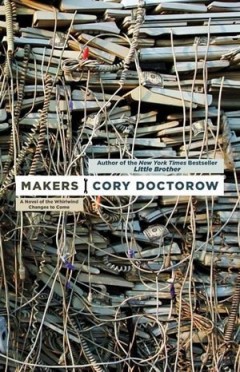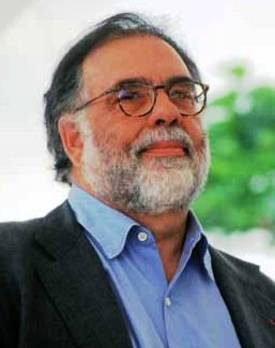I didn’t like Makers. I wanted to like it. Cory Doctorow, the author, is a cool geek and something of an ally in the struggle against intellectual property, i.e., government grants of monopoly privilege. But overall I just did not enjoy the book for a number of reasons.
To be sure, there are things to like about Makers. If you’re an avid reader of Boing Boing, you might like it. I only dip my toes in occasionally. Reading Makers is a lot like reading Boing Boing in novel form. Cory excels at imagining interesting gadgets and cool new uses for current and upcoming technology — the kind of geeky tech and pop culture things he and his fellow bloggers share on Boing Boing all the time, only some unspecified number of years into the near near future. The book will probably date quickly, but this aspect of it was fun…for a while. When it comes to things, Cory has an expansive imagination and a deep understanding. When it comes to people and plotting, on the other hand, his imagination and understanding seem to me to be more limited.
Makers started out as a novella titled Themepunks, serialized on Salon.com, though it appears Cory envisioned it from the beginning as merely the first part of a novel. I wish he hadn’t. Makers consists of three parts and an epilogue, with Themepunks being part one, the first 100 or so pages. Like Luke Burrage, I enjoyed part one, for the most part, but thought the novel went downhill from there.
As the novel opens we are introduced to the first main viewpoint character, a tech reporter by the name of Suzanne Church (Andrea Fleeks in Themepunks1). Suzanne attends a press conference held by the new CEO of Kodak/Duracell (or Kodacell), Landon Kettlewell. Kodak and Duracell are struggling companies in the near future. There’s no longer a need or market for their products. I guess they failed to innovate and remain competitive in a changing technological landscape. Kodak I can see. But Duracell? People won’t need batteries in the future? Duracell will fail to develop new power cells for new products? Really? In any case, Kettlewell and his financial backers decide to buy and merge Kodak and Duracell and then essentially gut them. The idea is apparently to trade on the old companies’ good brand names and use their capital to back a creative new business model.
Under Kettlewell, Kodacell becomes a kind of Grameen Bank of venture capital, engaging in micro-financing of garage-next-door would-be inventors and entrepreneurs. The business plan is for Kodacell to find untapped creative geniuses throughout the country, provide them with funding and a business manager, and act as the central coordinator in a distributed network of small, independent teams. A pretty nifty idea. This relatively non-hierarchical business model, the focus on 3-D printers, and a number of other aspects of the novel will be appealing to many left-libertarians, I think.
Suzanne then takes on the role of embedded journalist and later blogger when she travels to Florida to follow Kettlewell’s star makers, two young guys named Perry and Lester. She befriends them and reports on what they’re doing and on their relationship with a resourceful local squatter community (another thing left-libertarians and off-the-grid survivalists will probably like). Thanks in large part to her reporting a new worldwide movement is spawned and later dubbed the New Work (too New Deal-esque, for my taste, but at least it was a voluntary private initiative). Kodacell quickly attracts imitators and the new venture micro-capital market is soon unsustainably flooded with an excess of money, credit, and competitors. Irrational exuberance, I suppose.
I’m not sure what else might have changed from novella to novel other than this character’s name. ↩











